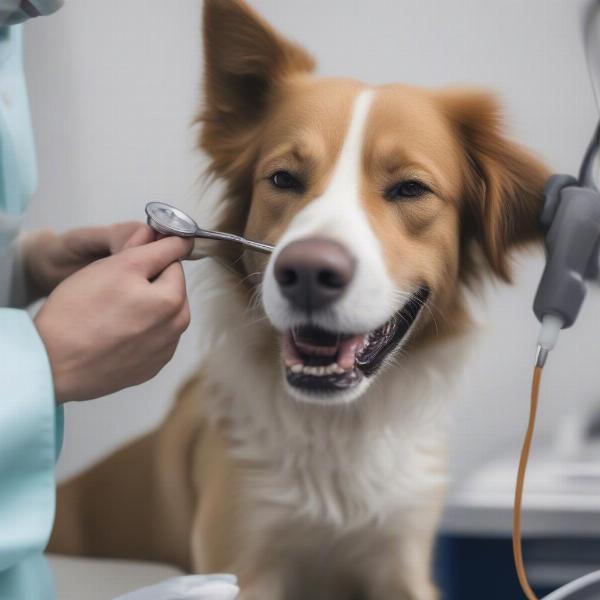Dog pacing and panting at night can be distressing for both you and your furry friend. Is your dog restlessly pacing the floor and panting heavily when they should be sleeping soundly? This behavior can stem from various reasons, ranging from simple discomfort to more serious underlying medical conditions. Understanding the root cause is key to helping your dog get a good night’s rest and ensuring their overall well-being. This article will explore the potential reasons behind nighttime pacing and panting, offer practical solutions, and guide you on when to seek professional veterinary help.
Why is My Dog Pacing and Panting at Night?
Several factors can contribute to this nocturnal behavior. Sometimes, the reason is relatively straightforward, such as an uncomfortable temperature or an unfamiliar environment. However, other times, the pacing and panting might signal a more complex issue. Let’s delve into the common culprits:
Discomfort and Environmental Factors
- Temperature: Dogs can become overheated, especially during warmer months or if their sleeping area is too warm. Panting helps them regulate their body temperature. Pacing might indicate they are trying to find a cooler spot.
- Unfamiliar Surroundings: A new home, a change in routine, or even guests staying over can make a dog anxious and restless, leading to pacing and panting.
- Noise: Loud noises, like fireworks or thunderstorms, can frighten dogs and disrupt their sleep.
Medical Conditions
- Pain: Arthritis, injuries, or other medical conditions causing pain can make it difficult for a dog to settle down and sleep comfortably. Pacing and panting can be signs of discomfort.
- Cognitive Dysfunction Syndrome (CDS): Similar to dementia in humans, CDS can affect senior dogs, causing confusion, anxiety, and changes in sleep patterns. Nighttime pacing and panting are common symptoms.
- Heart Conditions: Heart problems can make it difficult for a dog to breathe comfortably, particularly when lying down. This can lead to panting and restlessness.
- Other Medical Issues: Various other medical problems, such as Cushing’s disease, hyperthyroidism, and respiratory issues, can also contribute to nighttime pacing and panting.
What Can I Do to Help My Dog?
Identifying the underlying cause is crucial to implementing the right solution. Here are some steps you can take:
Addressing Discomfort and Environmental Factors
- Adjust the temperature: Ensure your dog’s sleeping area is cool and well-ventilated. Consider a fan or air conditioning, especially during hot weather.
- Create a comfortable and familiar space: Provide a cozy bed and familiar toys or blankets to help your dog feel secure.
- Minimize noise: Use white noise machines or earplugs to help block out disturbing sounds.
Seeking Veterinary Care
If you suspect a medical condition is contributing to your dog’s nighttime pacing and panting, consult your veterinarian. They can perform a thorough examination and recommend appropriate treatment.
 Dog panting at the vet
Dog panting at the vet
When to Worry and Seek Immediate Veterinary Attention
While occasional pacing and panting might not be cause for immediate alarm, certain signs warrant prompt veterinary attention:
- Excessive panting and difficulty breathing: This could indicate a serious respiratory or cardiac issue.
- Signs of pain: Whining, yelping, limping, or reluctance to move.
- Sudden changes in behavior: Increased anxiety, confusion, or aggression.
- Collapse or weakness: These are signs of a potentially life-threatening condition.
Conclusion
Dog pacing and panting at night can disrupt your dog’s sleep and yours. By understanding the potential causes and implementing appropriate solutions, you can help your dog rest comfortably and improve their overall well-being. Don’t hesitate to contact your veterinarian if you’re concerned about your dog’s behavior. A good night’s sleep is essential for both you and your furry companion.
FAQ
- Is it normal for dogs to pant at night? Occasional panting can be normal, but persistent or excessive panting should be investigated.
- Can anxiety cause pacing and panting in dogs? Yes, anxiety is a common trigger for these behaviors.
- How can I tell if my dog is in pain? Look for signs like whining, limping, changes in appetite, and reluctance to move.
- What is Cognitive Dysfunction Syndrome (CDS)? CDS is a condition similar to dementia in humans, affecting senior dogs.
- When should I take my dog to the vet for pacing and panting? If the behavior is persistent, accompanied by other symptoms, or you suspect a medical issue, consult your veterinarian.
- How can I make my dog’s sleeping area more comfortable? Ensure it’s cool, quiet, and has familiar bedding and toys.
- What are some natural remedies for dog anxiety? Consult your veterinarian about options like pheromone diffusers, calming supplements, or behavioral modification techniques.
ILM Dog: Your Partner in Pet Care
ILM Dog is your comprehensive resource for all things dog-related. We offer expert advice on dog breeds, health and medical care, training and behavior, nutrition, grooming, exercise, puppy care, senior dog care, traveling with dogs, and product recommendations. Whether you’re a new dog owner or a seasoned pet parent, we’re here to provide reliable, practical information to help you give your canine companion the best possible care. Contact us today for expert advice on all aspects of dog care, including breed selection, health, training, nutrition, and more. Email: [email protected] Phone: +44 20-3965-8624.